SOCG 2043: Global Warming Impacts and Policy Analysis
VerifiedAdded on 2023/01/18
|6
|1236
|24
Essay
AI Summary
This essay provides a comprehensive analysis of global warming, examining its multifaceted impacts on society, the environment, and the economy. The essay begins by defining global warming and highlighting its effects, such as rising sea levels, melting glaciers, and increased frequency of natural disasters. It then delves into the role of human activities, particularly the increase in greenhouse gas emissions, as a primary driver of climate change. The essay also explores various policy efforts undertaken to combat global warming, including the Paris Climate Agreement, UNFCCC, and Kyoto Protocol, evaluating their effectiveness and limitations. The author emphasizes the need for greater international cooperation and individual responsibility in addressing this critical global issue. Furthermore, it highlights the failure of existing policies and suggests potential future strategies for mitigating the effects of global warming. The essay concludes by reiterating the severity of the problem and the urgent need for more effective action to achieve the goals set by international agreements.
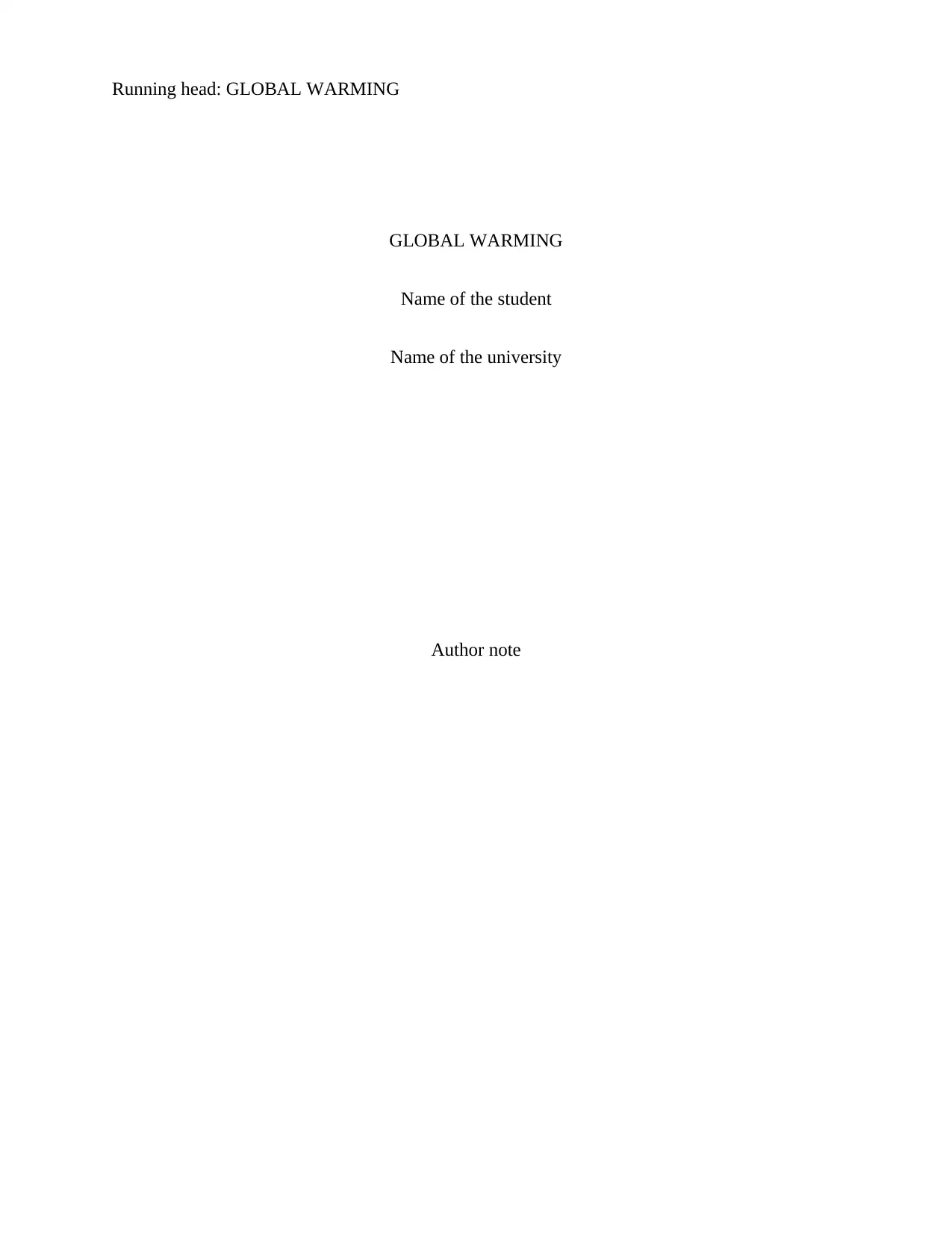
Running head: GLOBAL WARMING
GLOBAL WARMING
Name of the student
Name of the university
Author note
GLOBAL WARMING
Name of the student
Name of the university
Author note
Paraphrase This Document
Need a fresh take? Get an instant paraphrase of this document with our AI Paraphraser
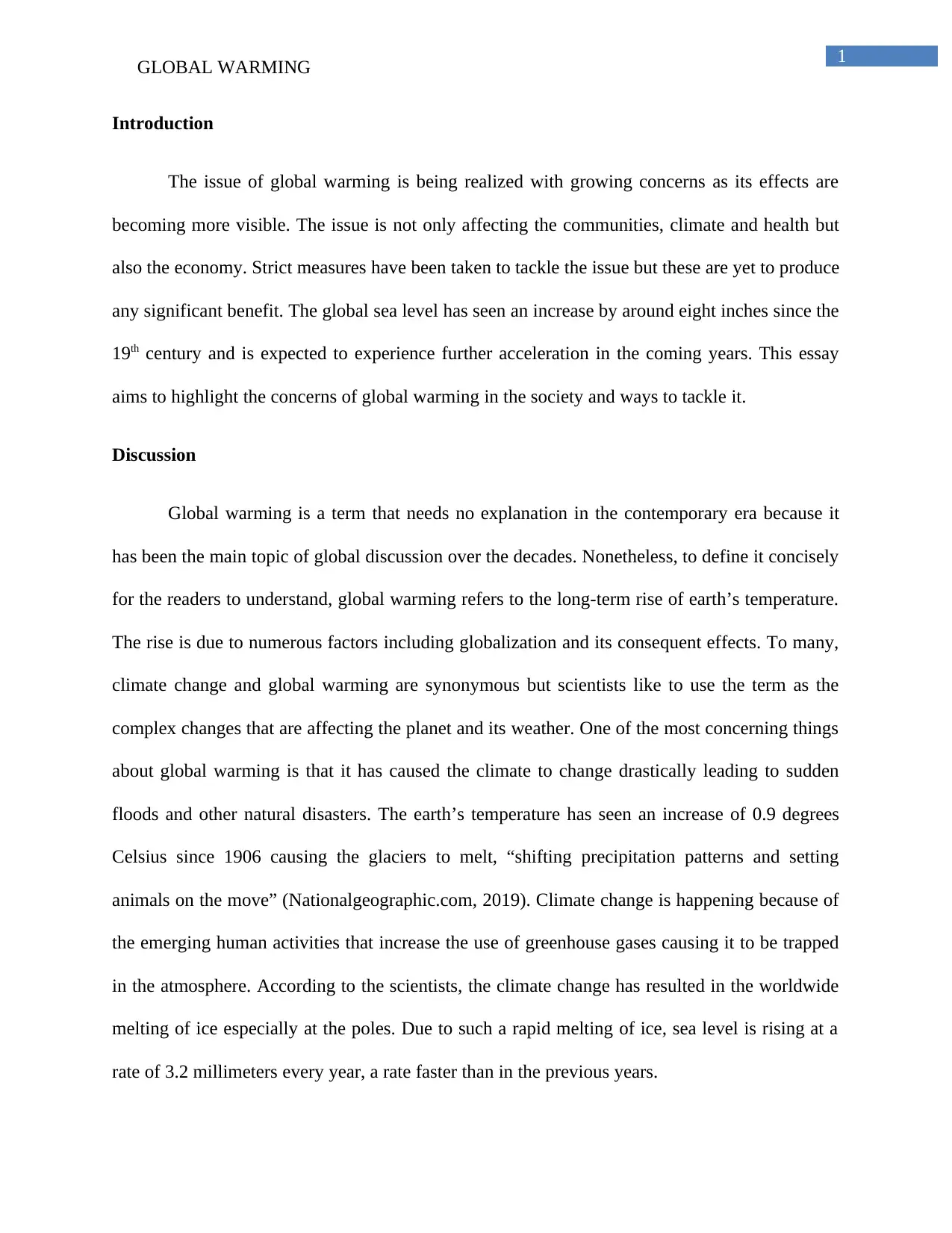
1
GLOBAL WARMING
Introduction
The issue of global warming is being realized with growing concerns as its effects are
becoming more visible. The issue is not only affecting the communities, climate and health but
also the economy. Strict measures have been taken to tackle the issue but these are yet to produce
any significant benefit. The global sea level has seen an increase by around eight inches since the
19th century and is expected to experience further acceleration in the coming years. This essay
aims to highlight the concerns of global warming in the society and ways to tackle it.
Discussion
Global warming is a term that needs no explanation in the contemporary era because it
has been the main topic of global discussion over the decades. Nonetheless, to define it concisely
for the readers to understand, global warming refers to the long-term rise of earth’s temperature.
The rise is due to numerous factors including globalization and its consequent effects. To many,
climate change and global warming are synonymous but scientists like to use the term as the
complex changes that are affecting the planet and its weather. One of the most concerning things
about global warming is that it has caused the climate to change drastically leading to sudden
floods and other natural disasters. The earth’s temperature has seen an increase of 0.9 degrees
Celsius since 1906 causing the glaciers to melt, “shifting precipitation patterns and setting
animals on the move” (Nationalgeographic.com, 2019). Climate change is happening because of
the emerging human activities that increase the use of greenhouse gases causing it to be trapped
in the atmosphere. According to the scientists, the climate change has resulted in the worldwide
melting of ice especially at the poles. Due to such a rapid melting of ice, sea level is rising at a
rate of 3.2 millimeters every year, a rate faster than in the previous years.
GLOBAL WARMING
Introduction
The issue of global warming is being realized with growing concerns as its effects are
becoming more visible. The issue is not only affecting the communities, climate and health but
also the economy. Strict measures have been taken to tackle the issue but these are yet to produce
any significant benefit. The global sea level has seen an increase by around eight inches since the
19th century and is expected to experience further acceleration in the coming years. This essay
aims to highlight the concerns of global warming in the society and ways to tackle it.
Discussion
Global warming is a term that needs no explanation in the contemporary era because it
has been the main topic of global discussion over the decades. Nonetheless, to define it concisely
for the readers to understand, global warming refers to the long-term rise of earth’s temperature.
The rise is due to numerous factors including globalization and its consequent effects. To many,
climate change and global warming are synonymous but scientists like to use the term as the
complex changes that are affecting the planet and its weather. One of the most concerning things
about global warming is that it has caused the climate to change drastically leading to sudden
floods and other natural disasters. The earth’s temperature has seen an increase of 0.9 degrees
Celsius since 1906 causing the glaciers to melt, “shifting precipitation patterns and setting
animals on the move” (Nationalgeographic.com, 2019). Climate change is happening because of
the emerging human activities that increase the use of greenhouse gases causing it to be trapped
in the atmosphere. According to the scientists, the climate change has resulted in the worldwide
melting of ice especially at the poles. Due to such a rapid melting of ice, sea level is rising at a
rate of 3.2 millimeters every year, a rate faster than in the previous years.
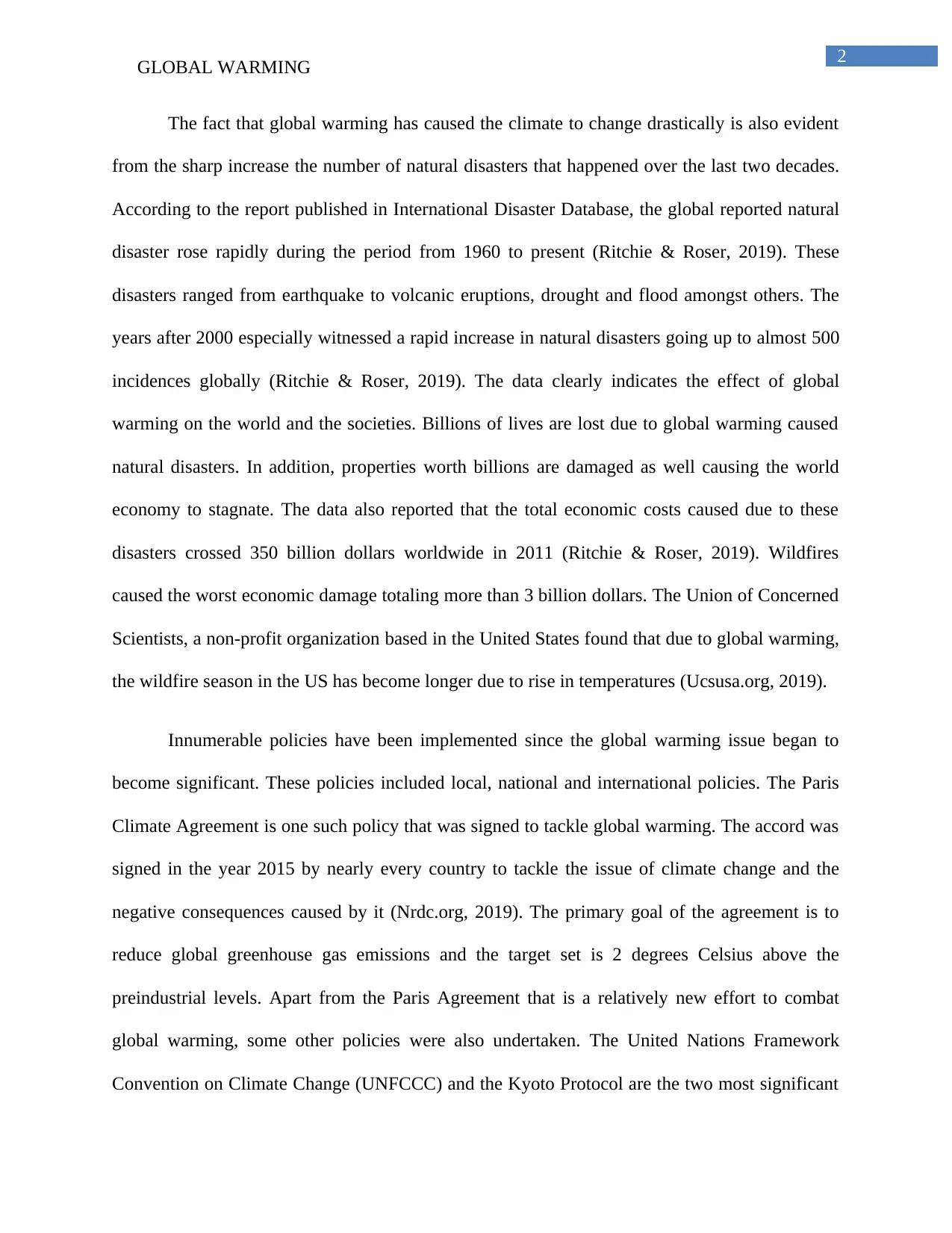
2
GLOBAL WARMING
The fact that global warming has caused the climate to change drastically is also evident
from the sharp increase the number of natural disasters that happened over the last two decades.
According to the report published in International Disaster Database, the global reported natural
disaster rose rapidly during the period from 1960 to present (Ritchie & Roser, 2019). These
disasters ranged from earthquake to volcanic eruptions, drought and flood amongst others. The
years after 2000 especially witnessed a rapid increase in natural disasters going up to almost 500
incidences globally (Ritchie & Roser, 2019). The data clearly indicates the effect of global
warming on the world and the societies. Billions of lives are lost due to global warming caused
natural disasters. In addition, properties worth billions are damaged as well causing the world
economy to stagnate. The data also reported that the total economic costs caused due to these
disasters crossed 350 billion dollars worldwide in 2011 (Ritchie & Roser, 2019). Wildfires
caused the worst economic damage totaling more than 3 billion dollars. The Union of Concerned
Scientists, a non-profit organization based in the United States found that due to global warming,
the wildfire season in the US has become longer due to rise in temperatures (Ucsusa.org, 2019).
Innumerable policies have been implemented since the global warming issue began to
become significant. These policies included local, national and international policies. The Paris
Climate Agreement is one such policy that was signed to tackle global warming. The accord was
signed in the year 2015 by nearly every country to tackle the issue of climate change and the
negative consequences caused by it (Nrdc.org, 2019). The primary goal of the agreement is to
reduce global greenhouse gas emissions and the target set is 2 degrees Celsius above the
preindustrial levels. Apart from the Paris Agreement that is a relatively new effort to combat
global warming, some other policies were also undertaken. The United Nations Framework
Convention on Climate Change (UNFCCC) and the Kyoto Protocol are the two most significant
GLOBAL WARMING
The fact that global warming has caused the climate to change drastically is also evident
from the sharp increase the number of natural disasters that happened over the last two decades.
According to the report published in International Disaster Database, the global reported natural
disaster rose rapidly during the period from 1960 to present (Ritchie & Roser, 2019). These
disasters ranged from earthquake to volcanic eruptions, drought and flood amongst others. The
years after 2000 especially witnessed a rapid increase in natural disasters going up to almost 500
incidences globally (Ritchie & Roser, 2019). The data clearly indicates the effect of global
warming on the world and the societies. Billions of lives are lost due to global warming caused
natural disasters. In addition, properties worth billions are damaged as well causing the world
economy to stagnate. The data also reported that the total economic costs caused due to these
disasters crossed 350 billion dollars worldwide in 2011 (Ritchie & Roser, 2019). Wildfires
caused the worst economic damage totaling more than 3 billion dollars. The Union of Concerned
Scientists, a non-profit organization based in the United States found that due to global warming,
the wildfire season in the US has become longer due to rise in temperatures (Ucsusa.org, 2019).
Innumerable policies have been implemented since the global warming issue began to
become significant. These policies included local, national and international policies. The Paris
Climate Agreement is one such policy that was signed to tackle global warming. The accord was
signed in the year 2015 by nearly every country to tackle the issue of climate change and the
negative consequences caused by it (Nrdc.org, 2019). The primary goal of the agreement is to
reduce global greenhouse gas emissions and the target set is 2 degrees Celsius above the
preindustrial levels. Apart from the Paris Agreement that is a relatively new effort to combat
global warming, some other policies were also undertaken. The United Nations Framework
Convention on Climate Change (UNFCCC) and the Kyoto Protocol are the two most significant
⊘ This is a preview!⊘
Do you want full access?
Subscribe today to unlock all pages.

Trusted by 1+ million students worldwide
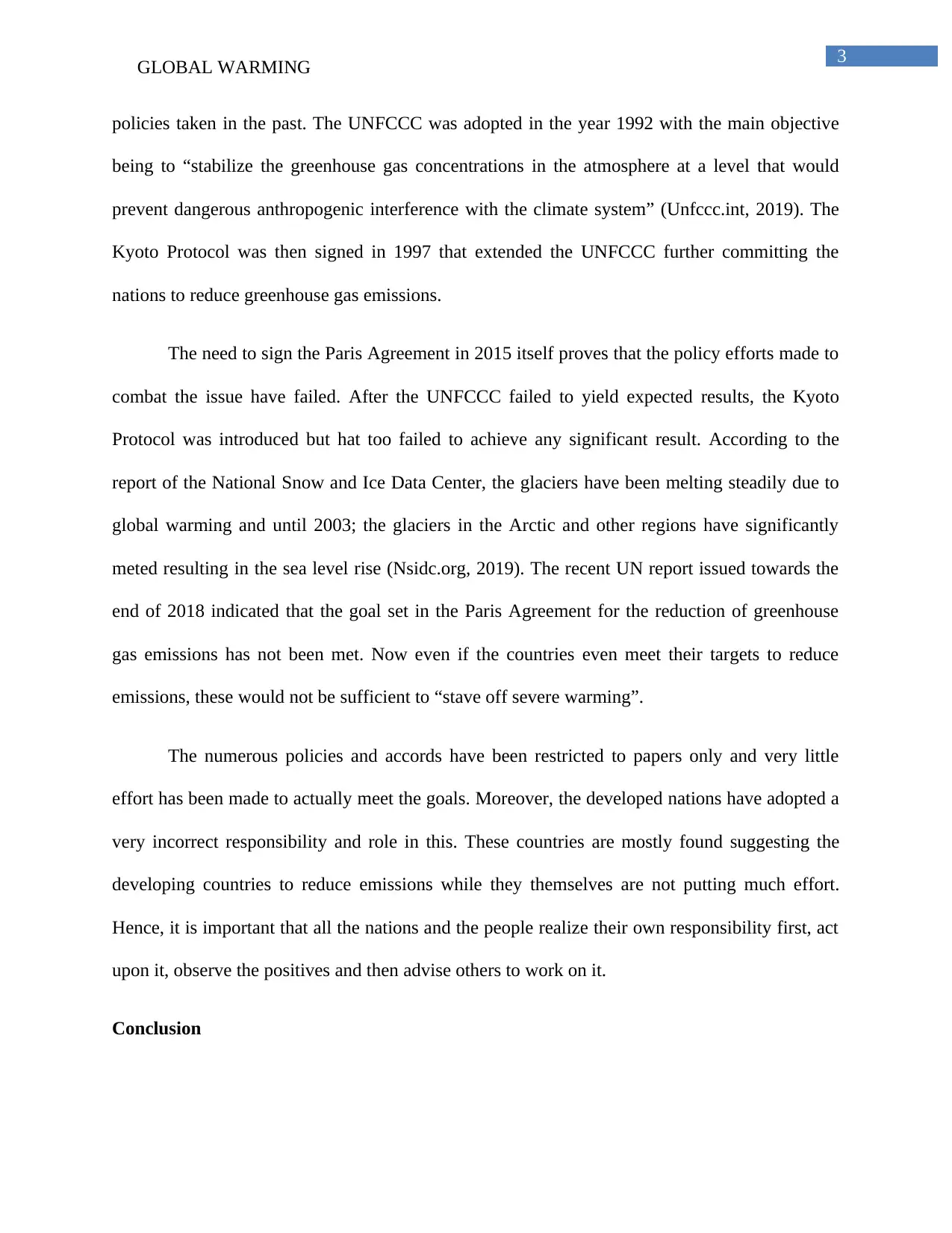
3
GLOBAL WARMING
policies taken in the past. The UNFCCC was adopted in the year 1992 with the main objective
being to “stabilize the greenhouse gas concentrations in the atmosphere at a level that would
prevent dangerous anthropogenic interference with the climate system” (Unfccc.int, 2019). The
Kyoto Protocol was then signed in 1997 that extended the UNFCCC further committing the
nations to reduce greenhouse gas emissions.
The need to sign the Paris Agreement in 2015 itself proves that the policy efforts made to
combat the issue have failed. After the UNFCCC failed to yield expected results, the Kyoto
Protocol was introduced but hat too failed to achieve any significant result. According to the
report of the National Snow and Ice Data Center, the glaciers have been melting steadily due to
global warming and until 2003; the glaciers in the Arctic and other regions have significantly
meted resulting in the sea level rise (Nsidc.org, 2019). The recent UN report issued towards the
end of 2018 indicated that the goal set in the Paris Agreement for the reduction of greenhouse
gas emissions has not been met. Now even if the countries even meet their targets to reduce
emissions, these would not be sufficient to “stave off severe warming”.
The numerous policies and accords have been restricted to papers only and very little
effort has been made to actually meet the goals. Moreover, the developed nations have adopted a
very incorrect responsibility and role in this. These countries are mostly found suggesting the
developing countries to reduce emissions while they themselves are not putting much effort.
Hence, it is important that all the nations and the people realize their own responsibility first, act
upon it, observe the positives and then advise others to work on it.
Conclusion
GLOBAL WARMING
policies taken in the past. The UNFCCC was adopted in the year 1992 with the main objective
being to “stabilize the greenhouse gas concentrations in the atmosphere at a level that would
prevent dangerous anthropogenic interference with the climate system” (Unfccc.int, 2019). The
Kyoto Protocol was then signed in 1997 that extended the UNFCCC further committing the
nations to reduce greenhouse gas emissions.
The need to sign the Paris Agreement in 2015 itself proves that the policy efforts made to
combat the issue have failed. After the UNFCCC failed to yield expected results, the Kyoto
Protocol was introduced but hat too failed to achieve any significant result. According to the
report of the National Snow and Ice Data Center, the glaciers have been melting steadily due to
global warming and until 2003; the glaciers in the Arctic and other regions have significantly
meted resulting in the sea level rise (Nsidc.org, 2019). The recent UN report issued towards the
end of 2018 indicated that the goal set in the Paris Agreement for the reduction of greenhouse
gas emissions has not been met. Now even if the countries even meet their targets to reduce
emissions, these would not be sufficient to “stave off severe warming”.
The numerous policies and accords have been restricted to papers only and very little
effort has been made to actually meet the goals. Moreover, the developed nations have adopted a
very incorrect responsibility and role in this. These countries are mostly found suggesting the
developing countries to reduce emissions while they themselves are not putting much effort.
Hence, it is important that all the nations and the people realize their own responsibility first, act
upon it, observe the positives and then advise others to work on it.
Conclusion
Paraphrase This Document
Need a fresh take? Get an instant paraphrase of this document with our AI Paraphraser

4
GLOBAL WARMING
Therefore, to conclude it could be reiterated that the problem of global warming is a
major issue that has not been addressed properly even today. The nations around the world have
to work harder to achieve the goals set in the Paris Agreement and the policies prior to it.
GLOBAL WARMING
Therefore, to conclude it could be reiterated that the problem of global warming is a
major issue that has not been addressed properly even today. The nations around the world have
to work harder to achieve the goals set in the Paris Agreement and the policies prior to it.
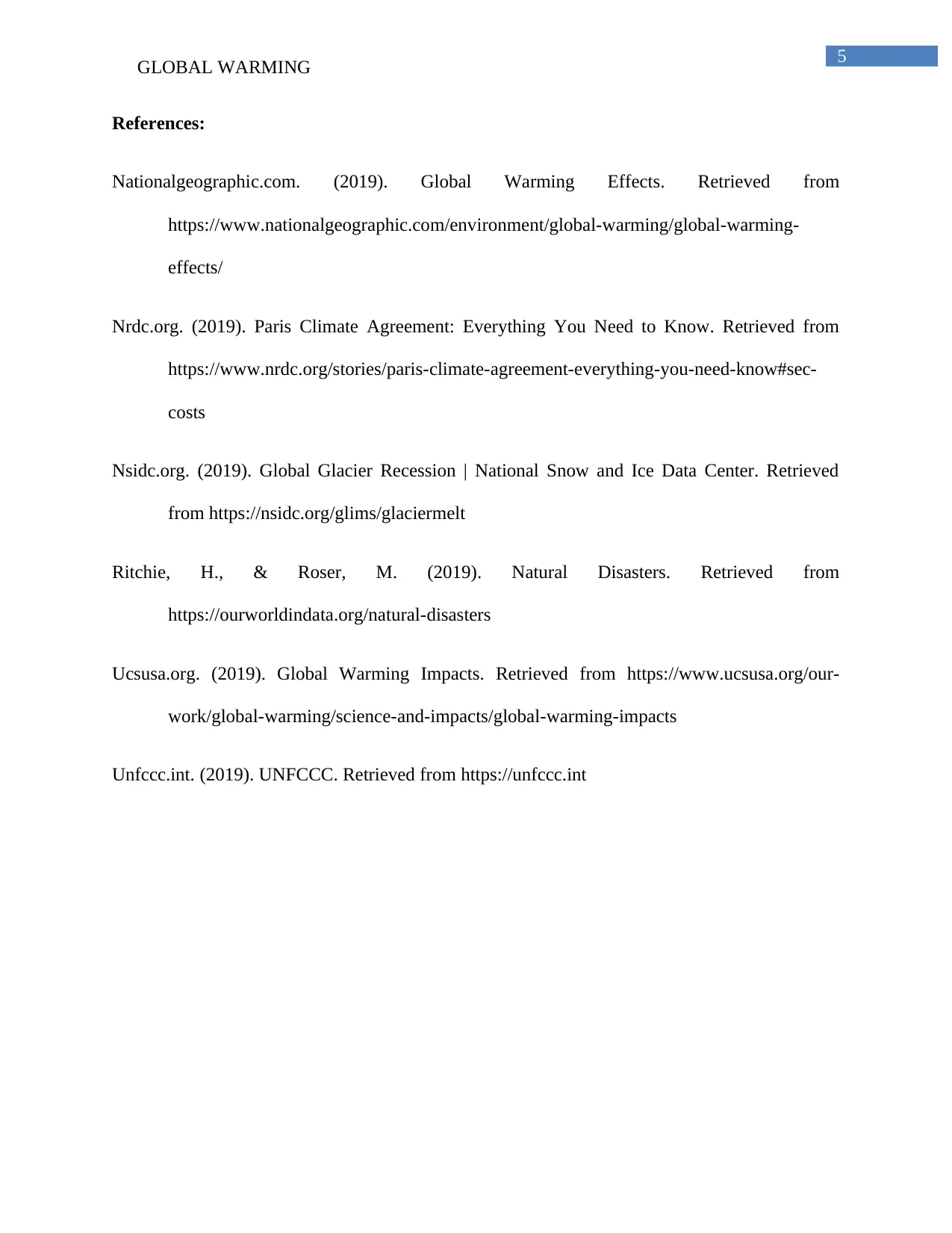
5
GLOBAL WARMING
References:
Nationalgeographic.com. (2019). Global Warming Effects. Retrieved from
https://www.nationalgeographic.com/environment/global-warming/global-warming-
effects/
Nrdc.org. (2019). Paris Climate Agreement: Everything You Need to Know. Retrieved from
https://www.nrdc.org/stories/paris-climate-agreement-everything-you-need-know#sec-
costs
Nsidc.org. (2019). Global Glacier Recession | National Snow and Ice Data Center. Retrieved
from https://nsidc.org/glims/glaciermelt
Ritchie, H., & Roser, M. (2019). Natural Disasters. Retrieved from
https://ourworldindata.org/natural-disasters
Ucsusa.org. (2019). Global Warming Impacts. Retrieved from https://www.ucsusa.org/our-
work/global-warming/science-and-impacts/global-warming-impacts
Unfccc.int. (2019). UNFCCC. Retrieved from https://unfccc.int
GLOBAL WARMING
References:
Nationalgeographic.com. (2019). Global Warming Effects. Retrieved from
https://www.nationalgeographic.com/environment/global-warming/global-warming-
effects/
Nrdc.org. (2019). Paris Climate Agreement: Everything You Need to Know. Retrieved from
https://www.nrdc.org/stories/paris-climate-agreement-everything-you-need-know#sec-
costs
Nsidc.org. (2019). Global Glacier Recession | National Snow and Ice Data Center. Retrieved
from https://nsidc.org/glims/glaciermelt
Ritchie, H., & Roser, M. (2019). Natural Disasters. Retrieved from
https://ourworldindata.org/natural-disasters
Ucsusa.org. (2019). Global Warming Impacts. Retrieved from https://www.ucsusa.org/our-
work/global-warming/science-and-impacts/global-warming-impacts
Unfccc.int. (2019). UNFCCC. Retrieved from https://unfccc.int
⊘ This is a preview!⊘
Do you want full access?
Subscribe today to unlock all pages.

Trusted by 1+ million students worldwide
1 out of 6
Related Documents
Your All-in-One AI-Powered Toolkit for Academic Success.
+13062052269
info@desklib.com
Available 24*7 on WhatsApp / Email
![[object Object]](/_next/static/media/star-bottom.7253800d.svg)
Unlock your academic potential
Copyright © 2020–2026 A2Z Services. All Rights Reserved. Developed and managed by ZUCOL.





